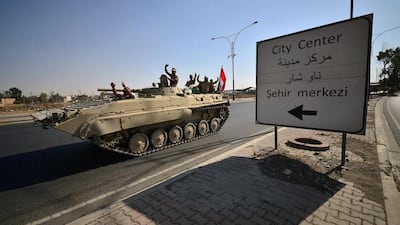It is heartening that both sides on the divide over Iraqi Kurdistan's push for independence have agreed to a ceasefire. This must be adhered to scrupulously, and the absence of fighting created by this agreement should be used to conduct extensive talks. Iraqis stand to gain nothing from infighting.
Iraqi prime minister Haider Al Abadi has risen to the occasion, demonstrating statesman-like leadership just when it is most needed. By showing restraint at this critical moment, he has acknowledged both that Baghdad is not looking to punish the Kurdish region at all costs and that there are more pressing conflicts still being fought, not least against ISIL extremists.
The decision by the government of the Kurdistan Region, Iraq's only autonomous area, to hold an independence referendum last month threatened to open Pandora's box just as Iraq had just achieved significant victories against ISIL after pushing the self-styled caliphate out of its strongholds in Mosul and Tal Afar. These successes were made possible by the sacrifices of Iraqis of all backgrounds who, after a seemingly interminable period of war and strife, united in common purpose to defeat a common enemy. ISIL still clings on to power in places such as Al Qaim and Rawa and Iraqis need to come together to liberate those places. And when ISIL is gone, there will be that other common enemy to defeat: corruption. Graft is so pervasive in Iraq that there is barely an area of public life uncontaminated by bribery. If not checked, it can cripple Iraq and diminish the prospects of generations to come.
____________________
Read more
Iraqi and Kurdish forces agree to a ceasefire, US-led coalition says
Iraqi Kurdistan's independence referendum will harm the people it claims to benefit
Iraq forces launch 'last big fight' against ISIL
____________________
The immediate aftermath of ISIL's fall was the moment to strengthen the frayed bonds among Iraqis, not to sunder people in the name of exclusionary nationalism. Yet Massoud Barzani, president of Kurdistan Region, chose to inaugurate a fresh, and wholly unnecessary, crisis by staging an independence referendum. The vote, threatening to include in a future Kurdistan multi-ethnic and multi-confessional lands such as Kirkuk, made a mockery of the sovereign powers invested in the central government in Baghdad. No government that allows its territorial integrity to be undermined in such a manner can claim to be the legitimate ruler of all Iraqis. So Baghdad moved to assert its authority. Iraqi forces stormed Kirkuk without any resistance on October 16.
The Kurdish peshmerga retreated. But that didn't settle the matter. The peshmerga began fighting back as soon as they regrouped in core Kurdish regions. And Iraq, which ought to have been awash in fellow-feeling after its triumphs against ISIL, was plunged into a fresh conflict. Earlier this month, these pages urged Iraqis to set aside their differences. "War begets more war", The National warned, calling for "bold vision and united leadership, not shooting wars for political gain".
Mr Al Abadi has given us all some cause for hope. This ceasefire must not go to waste. Iraq's political leadership, on both sides, must accept that the clamour over the country's division is not helping the people of the country. Rather, it is opening up avenues for interference by outside powers, such as Turkey and Iran, who see in Iraq's instability an opportunity to spread their influence. After nearly four decades of war, sanctions and internal strife, Iraqis deserve to live in peace and dignity.
Follow The National's Opinion section on Twitter

